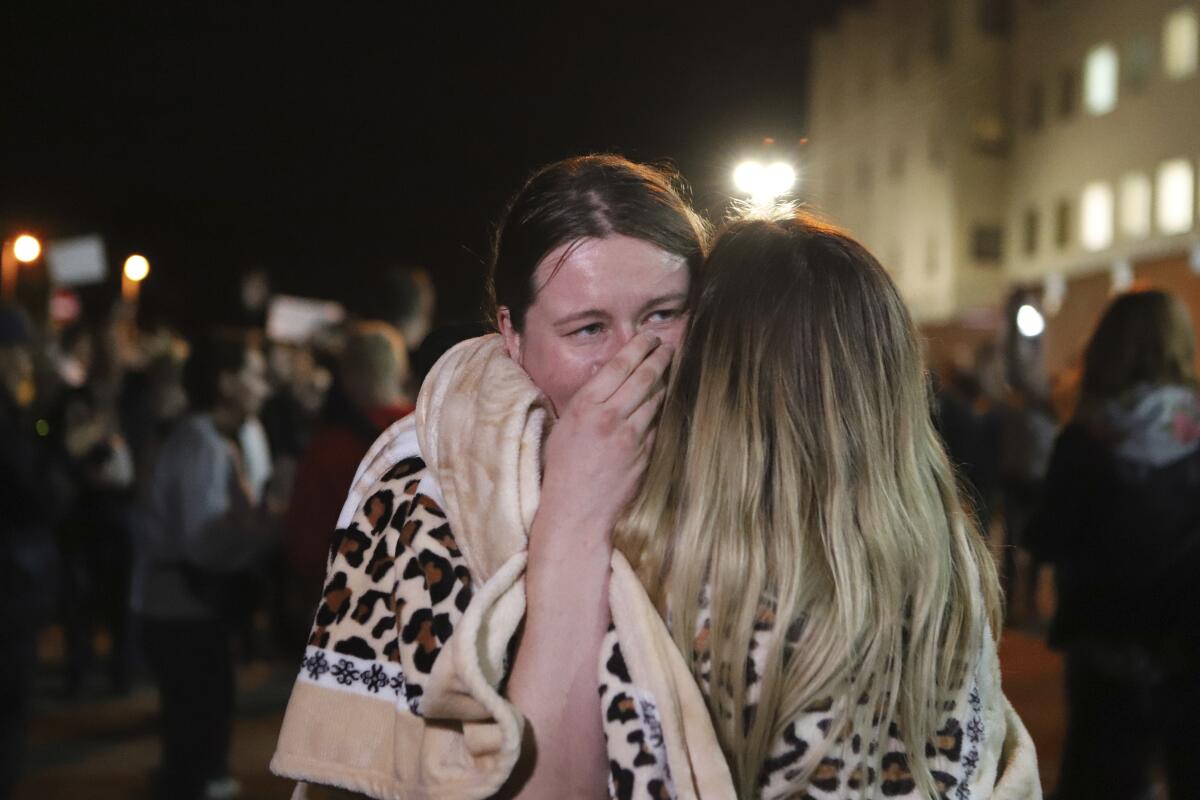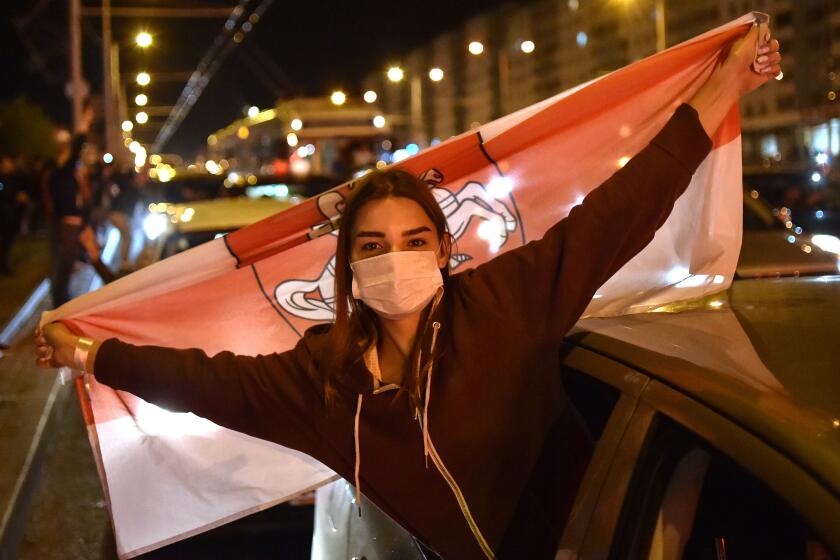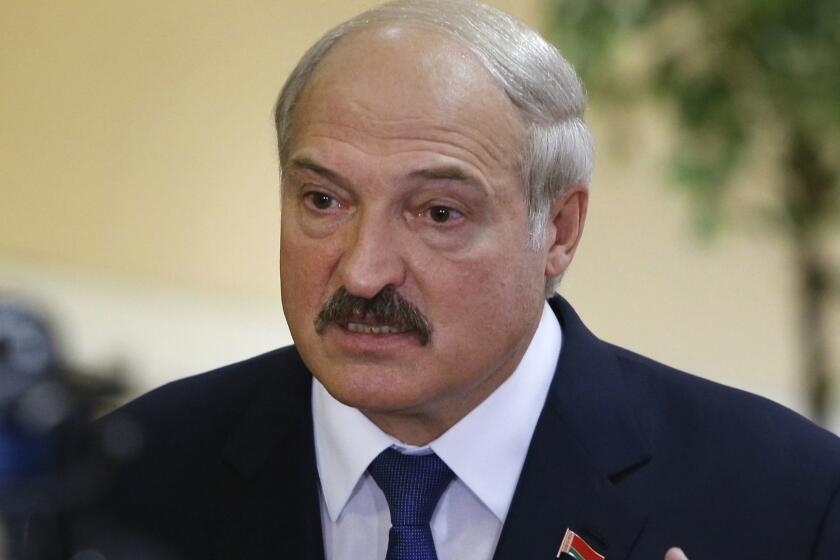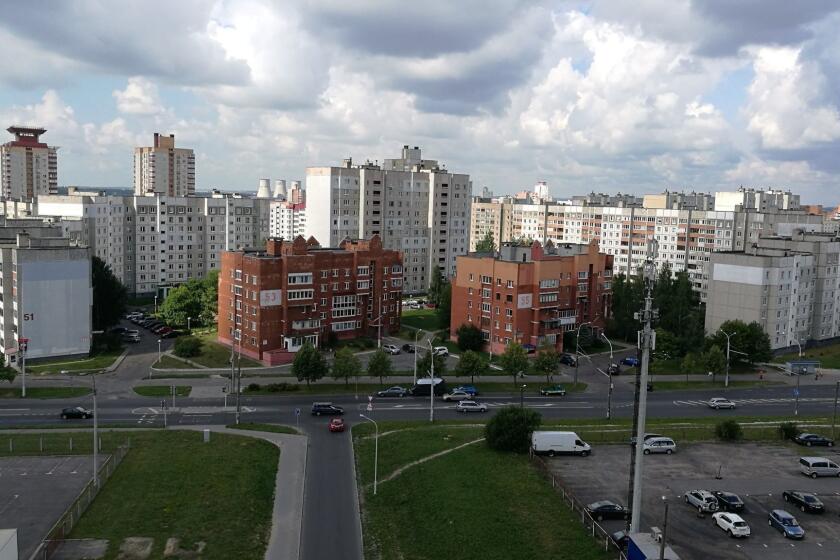Belarus authorities free thousands of detainees amid protester pressure

- Share via
MINSK, Belarus — Belarusian authorities have released at least 2,000 people detained during demonstrations contesting the reelection of longtime autocratic President Alexander Lukashenko, in a government attempt to assuage public anger against its brutal crackdown on peaceful protests.
Around midnight, scores of detainees were seen walking out of one of Minsk’s jails. Early Friday, volunteers also saw at least 119 detainees being released in the сity of Zhodino just northeast of the Belarusian capital. Ambulances arrived to carry those who apparently were unable to walk on their own.
Protests continued Friday as thousands again rallied across the country, and Lukashenko’s main challenger, Sviatlana Tsikhanouskaya, who fled on Tuesday to neighboring Lithuania, posted a video in which she disputed the results of the recent presidential election and demanded that the government start a dialogue with demonstrators.
Many of those who were released talked about brutal beatings and other abuse at the hands of police, and some showed bruises. Some wept as they embraced their relatives.
Hundreds of other detainees were released earlier Thursday. Belarus’ top law enforcement official apologized on state television for the indiscriminate use of force by police.
“I take responsibility for what they say was violence against those people who happened to be nearby and failed to back off quickly enough,” Interior Minister Yuri Karayev said late Thursday.
After “Europe’s last dictator” claims election win in Belarus, days of protests put spotlight on women.
The releases come on the day that European Union foreign ministers are due to meet to discuss possible sanctions against Belarus. To try to ease international criticism, Belarusian Foreign Minister Vladimir Makei said in a phone call with his Swiss counterpart that Belarus was ready for a “constructive and objective dialogue” with foreign partners on all issues related to the election and subsequent events.
In five days of massive protests, crowds of demonstrators swarmed the streets to contest the vote results and demand an end to Lukashenko’s 26 years of authoritarian rule.
According to the official results, Lukashenko won 80% of the vote and Tsikhanouskaya only 10%. Police have broken up protests with stun grenades, tear gas, rubber bullets and severe beatings. Nearly 7,000 people have been detained and hundreds injured.
Amid growing public dismay, dozens of military and police veterans posted videos in which they dumped their uniforms and insignia in the trash. Several popular anchors at Belarus’ state TV stations have quit.
The authoritarian president of Belarus has rejected a prospective law against domestic violence as Western “nonsense,” saying that physical punishment could be “useful” in raising children.
The demonstrations have spread even though the protest lacks leaders. Tsikhanouskaya had earlier called on her supporters to stop protests in a video that her associates said was recorded under pressure from law enforcement officials before she left Belarus for Lithuania. The 37-year-old former teacher had joined the race to replace her husband, an opposition blogger, who has been jailed since May.
The massive protests against election results and police brutality have been an unprecedented challenge to Lukashenko, who has been in power since 1994 and earned the nickname of “Europe’s last dictator” for his relentless crackdown on dissent. The scope and ferocity of the police clampdown were remarkable even for Lukashenko’s iron-fisted rule, triggering widespread anger.
Thousands of factory workers who previously formed the core of Lukashenko’s base have joined the protests, denouncing the police crackdown, demanding a new election and raising the prospect of a nationwide strike.
“Our entire shop voted against Lukashenko, and then we suddenly learned that he won by a landslide,” 42-year-old assembly worker Dmitry Glukhovsky said outside the Minsk Automobile Plant. “They not only have cheated us, but also beaten us up, and no one is going to accept that.”
It’s a long way from Silicon Valley to Minsk.
He said workers in his shop went on strike Friday to demand a new election. More than 1,000 workers could be seen in the factory’s yard, shouting, “Down!” in a call for Lukashenko to resign.
Another factory worker, 45-year-old electrician Viktor Konovalov, said a friend was detained during the crackdown. “People will not forgive that,” he said. “We don’t need their excuses, we need a new election and a new government.”
Workers also rallied at many other major factories. Clearly worried about the possibility of major strikes, Lukashenko warned that they would deepen the damage inflicted by the COVID-19 pandemic and could lead to Belarus losing its niche in global markets amid intense competition.
“Everyone is fighting for markets, and if we stop we will never be able to resume production,” he said. “You must explain it to the people.”
News Alerts
Get breaking news, investigations, analysis and more signature journalism from the Los Angeles Times in your inbox.
You may occasionally receive promotional content from the Los Angeles Times.
He didn’t directly address the election and the subsequent protests, but Belarusian upper house speaker Natalya Kochanova said late Thursday that more than 1,000 detainees had been released earlier in the day following Lukashenko’s order to law enforcement agencies to look more closely into the detentions.
“We don’t need a war. We don’t need a fight,” Kochanova said in televised remarks.
Valiantsin Stefanovich of the Viasna rights center confirmed that about 1,000 people have been released from jails in Minsk and Zhodino.
“The authorities are obviously trying to de-escalate the situation and ease the tensions, fearing that the furious industrial workers will take to the streets all across Belarus,” Stefanovich said.
More to Read
Sign up for Essential California
The most important California stories and recommendations in your inbox every morning.
You may occasionally receive promotional content from the Los Angeles Times.
















